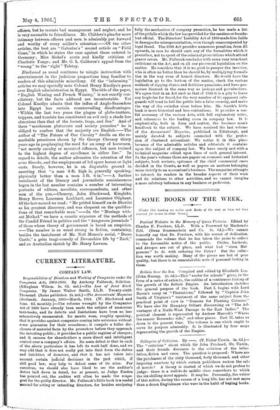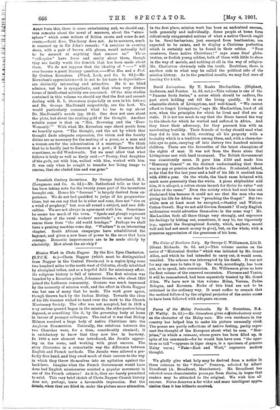Colloquies of Criticism. By —. (T. Fisher Unwin. 3s. 6d.)—
The "criticism" about which Sir John Prichard, Mr. Unwin, and their friends discourse is the criticism of the belles- lettres, fiction and verse. The question is proposed : Where are the purchasers of the sixty thousand, forty thousand, and other imposing numbers by which certain publishers reckon the sale of novels ? A theory is started of which we do not profess to judge : there is a well-to-do middle class somewhere to which the six-shilling novel appeals. It may be. Personally, the writer of this notice, during the course of a long life, has not met more than a dozen Englishmen who were in the habit of buying books. Apart from this, there is some entertaining and, we should say, true remarks about the novel of manners, about the " atmo- sphere " which some writers of fiction create and some do not create,—Scott does, Thackeray does not. As to manners, much is summed up in Sir John's remark: "A creature in evening dress, with a pair of brown silk gloves, would naturally fail to be amused at anything that amuses us." These "colloquies" have force and sanity about them, though they are hardly worth the flourish that has been made about them. We do not suppose that the identity of " —" will ever become a great literary question.—Wise Men and a Fool. By Coulson Kernahan. (Ward, Lock, and Co. 3s. 6d.)—Mr. Rernahan's appreciations—it is not to his taste to depreciate— are distinctly interesting and attractive. He is no blind admirer, but he is sympathetic, and that when very diverse forms of intellectual activity are concerned. Of the nine studies contained in this volume we should say that the first and second, dealing with R. L. Stevenson (especially as seen in his letters) and Dr. George MacDonald respectively, are the best. We would particularly commend what he has to say about Dr. MacDonald's novels (pp. 93-4). One does not care about the plots, but about the sterling gold of the thought. Another notable paper is that on "Mrs. Browning and the 'Ever- Womanly.' " With what Mr. Kernahan says about poetic form we heartily agree. "The thought, and the art by which that thought finds adequate expression, the vision and the faculty divine are as necessary for the making of a poem, as a man and a woman are for the solemnization of a marriage." We think that he is hardly just to Emerson as a poet ; if Emerson failed sometimes, so did Wordsworth. Yet we must allow that what follows is truly as well as finely said :—" Poetry, that daughter of the gods, sat with him, walked with him, worked with him. It was only when he sought to transfer her living image to canvas, that she eluded him and was gone."











































 Previous page
Previous page